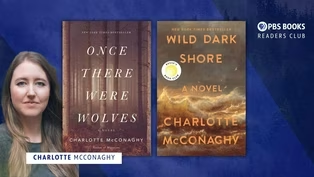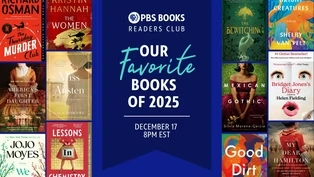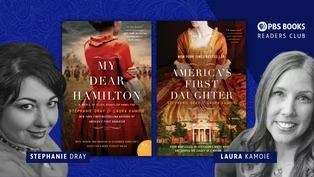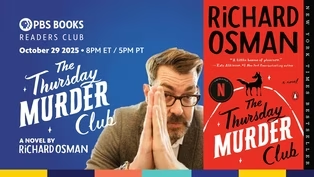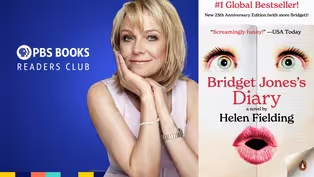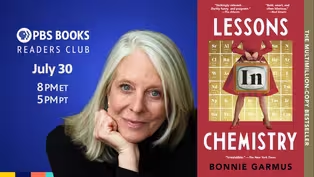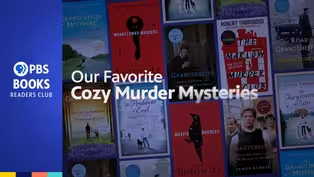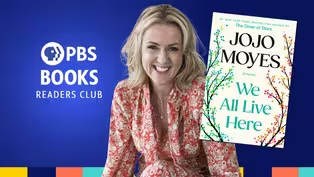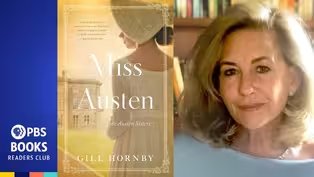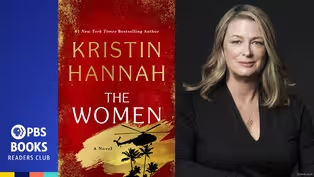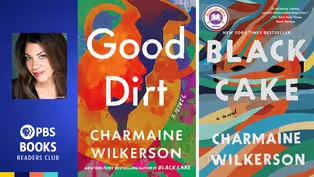
Readers Club | Ep. 209: Silvia Moreno-Garcia | The Bewitching and Mexican Gothic
Season 2025 Episode 56 | 52m 42sVideo has Closed Captions
PBS Books Readers Club welcomes award winning author Silvia Moreno-Garcia to discuss her new book.
PBS Books Readers Club welcomes award winning author Silvia Moreno-Garcia to discuss her brand-new thriller The Bewitching, and her New York Time Bestseller, Mexican Gothic. Dark, elegant, and deeply atmospheric, The Bewitching blends literary horror with folkloric dread, drawing readers into a web of obsession, memory, and witchcraft.
Problems playing video? | Closed Captioning Feedback
Problems playing video? | Closed Captioning Feedback

Readers Club | Ep. 209: Silvia Moreno-Garcia | The Bewitching and Mexican Gothic
Season 2025 Episode 56 | 52m 42sVideo has Closed Captions
PBS Books Readers Club welcomes award winning author Silvia Moreno-Garcia to discuss her brand-new thriller The Bewitching, and her New York Time Bestseller, Mexican Gothic. Dark, elegant, and deeply atmospheric, The Bewitching blends literary horror with folkloric dread, drawing readers into a web of obsession, memory, and witchcraft.
Problems playing video? | Closed Captioning Feedback
How to Watch PBS Books
PBS Books is available to stream on pbs.org and the free PBS App, available on iPhone, Apple TV, Android TV, Android smartphones, Amazon Fire TV, Amazon Fire Tablet, Roku, Samsung Smart TV, and Vizio.
Providing Support for PBS.org
Learn Moreabout PBS online sponsorshipMore from This Collection
The PBS Books Readers Club is a monthly digital-first series that brings its members into conversations behind the stories of your favorite books & shows. You can watch the online on the PBS App, with extended interviews available for PBS members on PBS Passport.
Readers Club | 302 Book Picks for Black History Month with Lauren Smith and Princess Weekes
Video has Closed Captions
PBBS Books Readers Club recommend their favorite Black History Month reads. (16m 16s)
Readers Club | Ep 301: Charlotte McConaghy | Once There Were Wolves
Video has Closed Captions
PBS Books Readers Club hosts author Charlotte McConaghy to discuss her novel Once There Were Wolves. (58m 55s)
Readers Club | Ep. 212: Our Favorite Books of 2025
Video has Closed Captions
PBS Books Readers Club celebrates the wrap of its second season with a highlight of 2025 (47m 55s)
Readers Club | Ep. 211: America's First Daughter | Stephanie Dray & Laura Kamoie
Video has Closed Captions
PBS Books Readers Club welcomes co-authors Stephanie Dray and Laura Kamoie (1h 1m 45s)
Wed Oct 29 2025 | Readers Club | Ep. 210: Richard Osman | Thursday Murder Club
Video has Closed Captions
PBS Books Readers Club welcomes celebrity writer Richard Osman to discuss his best-selling novel (52m 44s)
Readers Club | Ep. 208: Helen Fielding | Bridget Jones's Diary
Video has Closed Captions
PBS Books Readers Club welcomes beloved British author Helen Fielding to discuss her iconic novel (59m 30s)
Readers Club | Ep. 207: Lessons in Chemistry | Bonnie Garmus
Video has Closed Captions
PBS Books Readers Club welcomes international best-selling author Bonnie Garmus to discuss her novel (49m 3s)
Readers Club | Ep. 206: Our Favorite Cozy Murder Mysteries
Video has Closed Captions
PBS Books Readers Club hosts a special event sharing Our Favorite Cozy Murder Mysteries (52m 32s)
Readers Club | Ep. 205: We All Live Here | Jojo Moyes
Video has Closed Captions
PBS Books Readers Club welcomes international & New York Times best-selling author Jojo Moyes (57m 37s)
Readers Club | Ep. 204: Miss Austen | Gill Hornby
Video has Closed Captions
PBS Books Readers Club welcomes international best-selling author Gill Hornby to discuss her novel (51m 18s)
Readers Club | Ep. 203: The Women by Kristin Hannah
Video has Closed Captions
PBS Books Readers Club welcomes international best-selling author, Kristin Hannah to discuss novel. (53m 29s)
PBS Books Readers Club | Ep. 202: Good Dirt & Black Cake | Charmaine Wilkerson
Video has Closed Captions
PBS Books Readers Club is delighted to welcome critically acclaimed author Charmaine Wilkerson (55m 29s)
Providing Support for PBS.org
Learn Moreabout PBS online sponsorship(bright music) - But as I started to consider the idea of doing a book that had elements of witchcraft, I realized that there were certain parallelisms and interesting connections that you could draw between one type of folklore and the other.
They are definitely very different, but there is some connective tissue.
And so that, to me, sort to allow me to make a bit of a nesting doll of a story I thought.
(bright music continues) - Well, hi, and welcome to the PBS Books Readers Club.
- Today we welcome New York Times Bestselling author Silvia Moreno-Garcia to discuss her thrilling new novel, "The Bewitching," and her New York Times bestseller, "Mexican Gothic."
- "The Bewitching" is a haunting, multi-generational tale of three women bound by dark forces.
Graduate student Minerva is researching Beatrice Tremblay, a little known macabre writer, when she discovers Tremblay's most famous novel is based on her roommate's real-life disappearance in the 1930s.
As Minerva delves deeper, chilling parallels emerge between Tremblay's past and the witch stories passed down from Minerva's great-grandmother, Nana Alba.
Now those same sinister forces may be coming for her.
Oh no.
- Set across Mexico and Massachusetts, this uncanny saga weaves together the folklore of New England and Mexico into a dark tale that explores how evil can echo across generations.
- Hi, I am Fred Nahhat, here with Lauren Smith from PBS Books, joined by literary expert and award-winning writer, Princess Weekes and our PBS Book's National Director and resident librarian, Heather-Marie Montilla.
- Before we dig into this book, we wanna hear from you in the comments, did you love "Mexican Gothic?"
What did you think of "The Bewitching?"
Maybe you haven't read it yet.
What are you excited about?
What questions do you wanna pose for your fellow bookclubbers?
We love reading and responding to your comments in the chat.
- Looking to connect around books all month long?
Join the PBS Books Readers Club Facebook group to share recommendations and discuss your favorite reads anytime.
- It's the best book club ever.
Great stories are meant to be shared, so click share on Facebook or YouTube right now because friends do not let friends miss out on great books, and your support means the world to us.
- All right, so let's discuss.
Sylvia Moreno-Garcia's thrilling novel, "The Bewitching."
What did everybody think?
- Let's start with you, Heather because, look at her dress.
She's the cover of "Mexican Gothic."
It's amazing.
So you get the first take on this.
- Well, I love "Mexican Gothic."
Many people know I do not like horror as a genre.
I love "Mexican Gothic" though.
But I didn't know what to expect because what I do know is Silvia Moreno-Garcia, each of her books is so very different, which is actually why I love her because she keeps you guessing where is she gonna take you next.
One of the things really special is, you had three different time periods that were really developed in this.
And that took a lot of work and it just, it took you on this incredible journey, and I loved it.
- Yeah, I love everything she's written.
I'm a huge, like, "Mexican Gothic" apostle.
I'll preach it's good word to anyone who asks.
And I think that what she does so well is create these really engaging heroines that you really feel invested in and you want to protect.
I felt that way reading "Mexican Gothic" where I just wanted her to get out of that house.
- Oh, I mean, all the them.
- Yes, and now with this one, I was riveted through the journey.
And no spoilers, but everything left me kind of just like breathless, and I like that she's done it again.
She's one of the best writers out there right now.
- Agreed.
- Love it.
- She creates these strong characters, unique characters, also puts them in very special and unique places.
Her use of setting as an additional character, so to speak, is a wonderful blend of New England Gothic and Mexican folklore.
I mean, just couldn't get enough of it page after page.
- Well, the setting was I think so perfect because there is something, I lived in Boston for a couple years, there is something about New England that just makes you feel like there's ghosts around you.
You have the-- - The Salem witch trials, and Salem is right there.
And so I think that also like is so spooky to begin with.
- And New England births horror writers.
It just does.
There's something about the air there.
But then the comparison between that and the folklore from Mexico and the idea that some of the folklore is the same, and some of it's different.
And the way she wove that together across all three time periods, I thought, was amazing.
Also loved how each of her main characters, 'cause she had, it was 1908, 1933 and 1998.
And each of those female heroines had their own voice, their own identity.
They were linked, but just you really were fascinated by the characters and really involved in their story and wanting them all to just get out.
- I know And just aesthetically, I have to say, I love this cover.
It's so beautiful, just like the detail, everything about it.
The detail of it is just so beautiful.
Like, sometimes you look at a book cover and you're like, I don't want everyone to see this.
But you hold this one, it's like, I want everyone to know that I'm reading "The Bewitching."
- I'm honestly gonna use it as my Halloween decor this year.
Just line my bookshelves with copies of "The Bewitching."
It's beautiful.
- It's so good.
- So also, okay, if you know me, people that know me know that I am like into witches.
I like witchy things.
I went to a witch market last weekend and I got you guys thinking of "Mexican Gothic," I couldn't help myself.
So okay, reach in, take one.
Take one.
I'll never look at a mushroom in the same way.
Show our friends.
- I love this.
- I got one for me too.
- And you know what I'm gonna do?
I'm gonna put it on my PBS Books tote bag.
- Love it.
Awesome.
- I'm a key chain addict, so honestly this is actually, thank you.
- You are so welcome.
- Thank you.
- My weekend is booked.
(group laughs) - Author Silvia Moreno-Garcia is standing by to join us in just a moment to talk more about her captivating novels.
And we have so many questions, but first, we want to set you up to stay in the loop on PBS Books "Author Talks."
First, sign up for our PBS Books e-newsletter at pbsbooks.org/subscribe.
For exclusive book recommendations, author interviews and so much more, it's the best way to get the latest book updates right into your inbox.
- Then click over to YouTube and hit subscribe.
The PBS Books' YouTube channel features hundreds of author interviews, including Geraldine Brooks, Percival Everett on his Pulitzer Prize winner "James," Kristin Hannah on "The Women," Shelby Van Pelt on "Remarkably Bright Creatures," and so many more.
- And if you love the PBS Books Readers Club, consider supporting your local PBS station.
Now more than ever, this program and your PBS station are counting on support from viewers just like you and me.
So please if you can, visit pbsbooks.org/donate to make a gift.
- pbsbooks.org/donate will take you right to your local stations giving page.
There among many thank you gift options, you can support PBS Books directly by selecting one of our special gifts, like the PBS Books Readers Club book bag.
The stylish and durable book bag is your new go-to for toting all your latest reads, e-reader, laptop, and whatever else your literary adventures require.
And it's even got our logo so you can sport your love for public media.
- [Fred] Love that new PBS book swag.
We also have the official PBS Books Readers Club mug, just like the one we have here on the set.
Has the PBS Books logo on one side and "My Weekend is BOOKED" on the other.
Ain't that the truth?
- It sure is.
And the fun does not stop there because PBS members get access to PBS Passport, the member-exclusive section on the PBS app where you can stream full seasons of incredible PBS shows, including "Finding Your Roots," where you'll experience real-life mysteries of heritage being solved with Dr.
Henry Louis Gates Jr.
- Well, now let's turn the page to our book choice for this month, "The Bewitching."
(thunder rumbles) - Well, this just in, PBS Books is cursed.
- Our power is out, but never fear, we will interview Silvia 'cause we need to talk about this book.
- Yeah, do.
Starting right now.
- Well, here we are with a twitch in the nose together once again at a very special episode of the PBS Books Readers Club.
Let us now turn to our book selection of the month, "The Bewitching" and welcome in our guest author Silvia Moreno-Garcia.
Welcome to the PBS Books Readers Club.
- We are so happy to have you.
And we are gonna talk about your latest book "Bewitching" in just a moment, but I know so many of our viewers and readers have read "Mexican Gothic," have loved it.
We all wanna know what inspired this story.
How did you come up with it?
And tell folks that haven't read it yet a little bit about what "Mexican Gothic" is all about.
- Yeah, "Mexican Gothic" is about a young Mexico City socialite Noemi Taboada, who receives a curious letter from her cousin saying that she's in danger.
The cousin got married recently, and she's living in an isolated location.
And so Noemi goes to find out what is going on, whether there is something, a foul happening over there.
It was inspired by a visit that I had many, many years ago when I was a teenager to a town called Real del Monte, which is located in the mountains in Central Mexico.
And it is nicknamed Little Cornwall because it was mined by the British in the 19th century.
And it has something that is called the English Cemetery where all the English people were buried.
When I went there, it was in the evening, the fog was descending and it looked like the set of a old horror movie.
I thought Christopher Lee was going to jump out from behind the tomb.
- That book was amazing, and honestly, I don't know.
I don't think I have eaten a mushroom since.
(group laughs) I'm like traumatized over mushrooms.
But it was so, so good and so rich and so beautiful and I know a lot of people loved it.
- Including myself.
It was one of my favorite books I read earlier this year, and I've loved everything you've written, I'm a big fan, as you can see.
And as a fan of "Mexican Gothic," one of the things I really enjoyed about it was the blending of, you know, the ghost stories and haunted house archetypes with themes of colonialism and gender roles, while still maintaining the structures of those stories.
So I'm just wondering, as someone who was working with all of that, how did you blend those elements of fiction and history together as you were coming up with and writing "Mexican Gothic?"
- They just seemed to make sense.
Like I said, it was a place, a landscape that inspired partially "Mexican Gothic" as much as a genre as a category.
And that landscape came embedded with a certain kind of meaning.
You know, colonialism was right there because it was a British mining town.
There's colonialism certainly sometimes embedded in the gothic, whether explicit or implicit, when you read something like, let's say, "Dracula."
He is the exotic other, he is European, but he's supposed to be Eastern European so it's a little bit like, he's not one of us, he's not a British protestant, upright kind of guy.
He's a dangerous other.
And if you look at "Jane Eyre," the guy, his original wife is a woman from the Caribbean that she's mad and she's locked in the attic.
And there are associations in that historically with the Caribbean, America being a little bit of a dangerous place because there's kind of native influences that maybe taint the blood or change you somehow in eugenicist discourse.
And so there's these elements that kind of are already threaded there in some of this literature sometimes are easier to see or not.
Women definitely had a long association with the gothic, I mentioned the "Madwoman."
And you have also the figure of the heroine, kind of like the first final girl being the woman who survives the spooky house in gothic fiction.
And gothic fiction, because it tends to have that association with a house, often ties into domestic spaces.
So there's a lot that you can say about womanhood, about femininity, about motherhood, about family that is tied to the gothic.
It's a category that comes with a lot of rich illusions, I think.
- And Silvia, "The Bewitching" equally is captivating.
For our viewers who haven't read it, give us a author summary of what it's all about.
- "The Bewitching" takes place across three different timelines.
We are in 1998, then we're in the 1930s, and then we're 1908.
And we're going from Massachusetts in 1998 all the way back to the Mexican countryside in 1908.
It's three different women who in these very different time periods suddenly start to believe that something supernatural is stalking them.
- And so there's this element of intergenerational trauma, and different pieces of, as Princess mentioned, colonialism, classism.
Is there anything that inspired you particularly to write "Bewitching?"
- Well, a lot of the initial impulse for it came from the stories that my great-grandmother and my family would tell about witches and that particular folklore from Mexico.
It had a very different feel I thought to a lot of the current media that we see and some of the modern depictions of witchcraft, it certainly was a lot more disturbing.
And then the other side of it was that I lived in Massachusetts for three years.
And so when I lived there and I was studying there, I was exposed to a different kind of folklore related to witchcraft, kinda like a different witch history.
But as I started to consider the idea of doing a book that had elements of witchcraft, I realized that there were certain parallelisms and interesting connections that you could draw between one type of folklore and the other.
They are definitely very different, but there is some connective tissue.
And so that to me started to allow me to make a bit of a nesting doll of a story I thought.
- Well, building off of that, was there any particular meta significance to the three time periods that you talked about?
'Cause you said 1908, 1934 and 1998?
Why those three time periods?
- Although 1998 was easy because I was in school at that time so I could remember it and you know, I knew that time period, 1908, earlier 20th century is a time period that my great-grandmother used to talk about, so I also knew that intimately.
And the 1930s is a bit of the heyday of pulp fiction horror, pulp fiction and speculative pulp fiction in magazines starts to emerge.
That's when you start seeing writers such as H.P.
Lovecraft and Robert E. Howard and C. L. Moore kind of popping up in magazines.
And those magazines will become the parents of modern horror fiction.
Without those pulp fiction magazines, the publishing industry, the book industry wouldn't be as we know it.
It was mystery magazines and romance magazines and horror stories and science fiction stories, amazing stories, weird tales.
These kinds of publications that help create category differentiation as we know it.
And so literature used to be this smaller segment and everything got lumped into it.
And it really is magazines that help us to start to generate subgenres and categories, and that's how we get modern horror literature nowadays.
- That's so fascinating.
Thank you for teaching us all about this.
I'm captivated.
- So I'm a librarian, and so a lot of what I always wonder when I'm reading is about process.
You have so many details in this that, you know, yes, I would guess some is imagination.
But you've done a lot of research and also utilizing appropriate material culture.
How did you go about your research process?
- Yeah, for the 1930s period, I was reading books about the Great Depression, but I was also reading letters of contemporary writers of that era.
Lovecraft is very good for that.
He was crazy correspondent, like the pulp fiction arena where you can go, you can see his letters and you can see, it's like social media nowadays.
And so he and other writers, people like C. L. Moore if you can find some of those letters, they are very useful for making sense of that time period.
I also looked, yeah, like I said, the Great Depression.
There was a very good book of interviews of women that had gone through it, for example, and what it was like to be a woman in this time period, what you had to do to keep a house afloat.
For 1908, for when we are in mexico, yes, I had a lot of knowledge of this time period and oral knowledge and family knowledge.
I also looked at a number of folklore studies to see what they were saying and match some of the knowledge that my family had spoken to some of these folklore studies, and it matches really, really well.
My great-grandmother knew how to tell stories, and so a lot of the things that she talks about are later reproduced in these accounts, ethnographic accounts and folklore studies of the area where people go back decades later and they're doing studies on witchcraft or things like that, or magic beliefs in a certain area.
- You talked a lot about the time and the place.
And I found it so interesting the way that you compared the New England folklore.
I spent some time in Boston myself and it does have sort of this like spookiness about it, and other authors have written about it too.
And just that like university spookiness, I don't know, there's something about it, and then comparing it to the Mexican folklore.
And you talked about in the book this, like, common consciousness, and how the idea of witchcraft shows up in so many different cultures across time and space.
I wanted to get your thoughts about that and why you think these stories show up in the stories of so many different cultures across so many different types of places.
What are the similarities between the folklore from Mexico versus puritanical New England?
How did you mash that all up?
- One of the big differences between puritanical New England and Mexico is that, in New England, there's a clear attribution to the devil being kind of responsible for witchcraft.
So often when people are being interrogated, there's a question of like, well, how did you get in touch with the devil?
And people say, oh, you know, I did this, I did that to kind of like phoned the devil and on then.
And now we have a covenant, we have a contract.
There's a lot of talk of contracts and this sort of thing.
You don't see that in Mexico really, like, the devil being talked about in that way.
I mean, there's certainly the Spanish Inquisition at a certain point in time, but Mexico, a lot of the witchcraft beliefs are coming from a pre-Hispanic tradition that predates European ideas, and then they're mixing with some of that European colonialism that happens and becoming a little bit different and changed throughout time.
But because of that, the source is not necessarily the devil because although pre-Hispanic thought does allow for the use of witchcraft, it's not necessarily that Satan, that specific figure is the one that's allowing you to do this magic or that you are serving Satan.
And there are many kinds of witches and magical practitioners in pre-Hispanic Mexico, a dozen or so different names that I could talk about.
Very different kind of sub-varieties of witches and magical practitioners.
And the Spaniards when they come, they just kind of collapsed all of that under one name.
They just call it bruja or brujo, witch.
But it doesn't differentiate really between somebody, like, that's doing astrology, somebody that's kind of consulting the days, a day reader, that's reading the signs of what's going to happen.
It doesn't differentiate between somebody who's doing more of a healing role, (speaks in Spanish) or repelling kind of like bad witch, undoing witchcraft, that sort of stuff.
And figures like witches that are transforming into animals, or blood-drinking witches, or there's a type of witch that eats the ankles of people in old nautical folklore.
So they all become one single category, and there's a lot of differentiation in that kind of pre-European state of different types of witchcraft.
But the devil is not a figure that emerges really very clearly in Mexico in that time period as clearly as it does in New England, where there's definitely a lot of talk.
And witchcraft becomes a thing of the past in a way in New England, and in Mexico, it is still a living force, a living thing.
- And you talk a lot about the folklore of witchcraft and the uncanny, but you also referenced a few times throughout the book Greek mythology.
And there was one specific analogy, you compared one of the cursed women to Persephone being dragged into the depths of the underworld.
Can you talk to us about your interest in Greek mythology, how that influences your writing, and how that blends with some of the themes of North American folklore and witchcraft?
- I think fairytales and Greek mythology were probably the earliest things I remember reading as a kid for fun.
Nowadays, young people have children's books, but back when I was growing up in Mexico, yeah, children's literature for me at least was, you know, they would give me, like, "The Three Musketeers," there you go.
That's good children's literature.
- Now read "The Odyssey."
(laughs) - Yeah, "The Odyssey."
So I did read a lot of mythology and fairytales.
So mythology has the same fluid quality that we're talking about storytelling.
It changes, it's malleable, and sometimes, it doesn't follow the narrative designs of modern literature, which I find very fun, fairytales too.
Things happen because they happen in oral storytelling, and sometimes things happen just because in mythology, and there's no like really deep explanation.
You have somebody and they arrive maybe at a river, and some kind of water spirit rises and starts talking to them, asks for a favor, or drags them into the depths.
And there's no kind of like, we shall now explain, you know, the physical properties of water spirits to you in great detail.
There's this certain kind of understanding of the fantastic in mythology and in fairytales that it just kind of happens.
it's there.
And so I love these kinds of works because I think they take us back to a time and place in which we were willing to understand the coexistence of the fantastic within the real in a much more kind of childish way.
- Yeah, it's like being a kid again, working that imagination.
- I am always up for a quest.
- So I'm a big believer in the power of music.
And you've incorporated quite a track list of '90 music, both music I was familiar with and then a lot of Spanish music that I wasn't as familiar with.
I am a product of going to high school and college in the '90s.
But the music was throughout the story.
Were these personal picks or they were more for Minerva?
- Well, I like 1980s alternative music.
- Same.
(laughs) - You know, called "120 Murders," and we were all picking a song from the alternative music era in the '80s and the '90s, and I picked Garbage.
And my song was... My story is told superstition and it has to do with magic.
My song was "I Think I'm Paranoid."
So I did, you know, I do like-- - That's my karaoke song.
(Lauren and Princess laughs) - I do like that sound from that era.
But when I make music lists, I am not necessarily thinking only about my taste.
I'm thinking what somebody would enjoy, if it would get them in the vibe of either a character or a book.
And so I have a playlist for "Mexican Gothic" that has certain kind of sound.
And it's different from this playlist because here I did wanna evoke the 1990s slice of the story - And it's pretty easy for people to find the playlist.
I found it.
But where would people go?
I think they can go to your website to see it.
- Yeah, they can go to my website.
And under the page of "The Bewitching," there's a link to it.
And also it's on the Penguin Random House Spotify account, is the one hosting.
- I think that's gonna be right up your alley, Mr.
'90s.
- Best music ever.
- That's my era.
I love Garbage.
But speaking of Minerva, I love that character.
She was so smart, introverted, but also could be brave and outspoken.
Can you talk about her character development, how she began to form in your mind?
And were there elements of your own personality that you incorporated into Minerva's character?
- Yeah, one of the things that I noticed sometimes when people write about academic environments in academia, in especially in fantastic spaces is that, it's all the glamour and none of the pain.
And it's not always as glamorous as people portray it, so I wanted to show somebody who is struggling with her thesis, which is a very common thing.
There's a certain time of the year when if you're in university and you're walking through the hallways, it's like, I have no time.
I have to, you know, finish my bibliography and show it to my advisor.
That kind of situation you're like, don't touch that person.
They are in the middle of it.
- This is the nightmare I have reoccurring, by the way.
- And it will follow you years later when you wake up, you think that you are not ready for your examination.
I wanted to get a real sense of somebody who is in the midst of academic pursuits and all the stress that that has, and especially all the stress when you don't have the money.
So I really wanted to show that side of an academic, and create an academic who perhaps resemble the academics that I know and love and who are sometimes really very obsessive about very niche and narrow topics.
But I find it endearing when somebody loves something so much that they wanna know every little bit about it.
And I wanted to reflect that personality as opposed to maybe an idealized character.
- I actually, I did my master's thesis on fairytales, and it was very hard for my parents to just have me talking about Snow White over and over again and be like, "Have you heard this variation of this story?"
And they're just like, "Is this what we're sending you to grad school for.
so you can tell us about Jack and the Beanstalk in excess detail?"
- I would like to read that, Princess, please send it over.
(Lauren and Princess laughs) - What a folkloric.
Speaking of Minerva, she has asked at one point in the book, why dedicate a life to writing and to academia?
And let me get this right.
She says, "It's the romance of it.
You know every detail about someone, their every word and thought.
When you look at their writing, you swoon over a sentence fragment or a turn of phrase.
It's as if through the midst of time someone reaches out and touches their hand."
Is that a moment of self-reflection?
Is that something of you coming through in that writing?
- Yeah, I definitely think that the reason why I like, I like to read a lot of old books and old stories, 100, 200 years old and kind of look at that.
It is a way to time travel if you don't have a DeLorean and you know, travel back.
- It's a movie from the '80s, everybody, in case you don't know.
- You can really time travel and see a completely different space, a completely different land, a completely different people through things like literature or history, and it's very exciting.
I met a lot of people and I saw a lot of places through books when I was growing up in Mexico.
I got to see Paris because I read "The Three Musketeers" and I got to see New England because I ended up reading "Moby Dick" and I got to see the jazz age because I read Fitzgerald.
And so it was a very exciting thing.
- Well, one of the things I love about your work is that, you craft so many amazing supporting characters and I never know who to trust and who to be suspicious of.
And without giving any spoilers, as the writer, do you always know how these characters are going to intertwine and what their end role is going to be?
Or does that kind of unfurl as you are crafting the narrative?
- My outlines are generally very detailed, so they include a lot of the information ahead of time, especially because I have to do a lot of historical research for many of these books.
So I kind of need to know what I'm be going to be able to work with before I start, although some research keeps happening while I'm still working.
I will say one of the things that I believe in is something that Alfred Hitchcock said, which is that, the meaning of suspense, what is suspense.
And he said that if you put a box under a table and people are having like lunch at a place and there's a box under a table and you don't know what it is as the audience, whereas same scene, but now as the audience, you've seen that somebody put a bomb in that box and it's under the table, but the people eating their lunch don't know.
- Just gonna check really quick now.
Okay, we're good.
(laughs) - And so you get more information as a reader than the characters.
But he's saying that that doesn't diminish the enjoyment of the piece, it makes it more enjoyable because now you have this information where you're thinking like, how is this gonna fit?
Or when is this going to explode?
So I don't necessarily believe in like, oh, we're gonna keep it all a big secret and nobody's gonna have any idea what's going on.
I love that sense of suspense.
I love seeing the ticking time, allowing readers to see the ticking time bomb and the people are having, you know, their chocolate or whatever, but you're going like, oh, this is gonna explode very soon, and wow.
So I love that sense of suspense.
That's what I hope to create.
- We love it too.
I think I hardly stopped reading any of your books.
I just can't.
I just need to know what's gonna happen on the next page.
They're quick reads because you can't put them down.
- Well, and building on that, can you share, so we've talked a lot about process.
Was the process of writing very different for one versus the other?
And when you went to write "Bewitching," was that something that you wrote all three timelines separately or did you go back and forth between them?
- It was just chronological.
So chapter one and then chapter two and then chapter three because I had the outline, so I was just going like that.
It was fun to switch because sometimes when I was like, I've been in this, I don't wanna be in this character a little bit anymore, then I got to switch to another one, so that was really, really fun.
And I really enjoyed when I was switching into the first section point of views, like, I say, I don't get to do it that often, so being able to do the Beatrice Tremblay sections was like a fun vacation in the middle of a novel.
- That's awesome.
- I know you already said that you do outlines and you kind of outline everything.
So I think I would ask then, when do you stop?
Because I feel like as someone who likes to research, I could like, keep going forever.
When do you have a sense of like, "I've outlined enough.
I'm ready to actually start the writing process?"
- It's very much an analytical process.
I often describe it as caterpillaring, that a caterpillar eats enough leaves and green material and eventually it's chunky enough to become a butterfly, and it's like that for me.
There's a point in which I feel I'm full.
I cannot keep reading any more, you know, letters from such and such person to another person, I just will not do it.
And then I begin the process.
But there's no hard and fast rule.
It's a question of like, do I have enough fuel in the tank?
Am I ready to go?
And some other research will continue, like I say, as I'm writing, new questions might emerge.
Sometimes I'm like, oh, I didn't check the price of butter.
Like, gotta go find a newspaper now and check the price of butter, but yeah.
But a lot of the big questions have already, I've kind of thought them through and I feel I'm ready to begin.
- So I wanna talk about the genre of literary horror and gothic sort of in general for a moment.
What draws you to reading that genre and writing within it?
Do you find that sometimes, and I think this was you Heather, you mentioned that you don't normally really like to read horror, but then you got into Sylvia's books and it sort of opened a new world for you.
Do you feel like sometimes there's like that prejudice that people that assume they don't like it and then they read it and then they get into it.
And also, you know, some of the scenes you write are scary?
Like, how do you deal with that as a writer?
I would scare myself if I was writing it.
How do you manage all of that?
- Yeah, horror is often considered the most minor of all this levels of genres, is kind of like the dirty genre.
It's the only genre that people have approached me and have told me, are you okay?
(group laughs) - Just like I just said, yeah.
- You write a lot about murder, do you wanna murder somebody?
And it's like, no, I do not, you know.
I like eating candy and, you know, like cooking flowers.
That's my, you know, some of my things.
But yeah, because there is, I think the idea that if you are exploring something dark, then there must be kind of like view, you wanna dwell in the dark, but that's not necessarily true.
Genres come all of them with a certain kind of tools if you open them.
If you open the noir box of genre, there's maybe a dame who's at your door and asking you to find her husband, there's a detective in a trench coat, there's dark smoky streets.
Okay, that's the noir box.
What I find about them is that you can use those elements in many different ways.
You can either do the straight story or you can play it differently.
You can maybe tell the story from the point of view of the femme fatale, you know?
So now it's not the guy watching her as she walks in very sexually into the room.
It's her watching in and she looks at him and she thinks, "What a sucker.
It's gonna be so easy a murder on my husband than this guy."
So you can either work within the confines of a story or kind of push against it, and I like doing both 'cause I think there's power in doing both.
And doing both, doing the expected and then working the unexpected.
- And Princess, you know as well as I do, it's rooted richly in New England history and folklore and the rest, but also in bigotry, also, well in a sense, of a fear of the other.
What's your take on that work now and how has it maybe impacted your own writing?
I think we're all curious.
- Yeah, my thesis work was actually, my degree is in science and technology studies.
And my thesis was called "Women eugenics and the work of H.P.
Lovecraft."
So I looked at those three things.
So I'm very familiar with H.P.
Lovecraft's work and his personal life.
I love H.P.
Lovecraft's writing.
I find it very interesting that his ideas of cosmic horror.
If you read enough pulp fiction from the time, you realize that not all writers are very nice people.
And even brilliant writers are sometimes the most awful of people that you could ever imagine, and Lovecraft certainly has that in him.
After H.P.
Lovecraft, you're gonna get a lot of other people.
You're gonna get Stephen King, you're gonna be Peter Straub.
But eventually you're gonna get people like Victor Lavalle, and Gabino Iglesias, and Stephen Graham Jones who are going to take this toolkit that I talked about, this horror, which comes with a lot of things, not only the vampires and the ghost, but also comes with your Lovecraft eldritch horror bits and this and that and the other, and they're going to use it to tell their own stories.
And so when you read Victor Lavalle's work, something like "The Changeling," something like Stephen Graham Jones' "The Only Good Indians," well, some of those works are taking elements of what Lovecraft did, or some ideas.
But they're not just doing a pastiche, they're not just reproducing what they did.
And that's one of the fun things that you can do in literature, is that you can have a dialogue with a genre, with a writer, with several writers, and they can all be dead, you know?
It's fine.
By the time "Wide Sargasso Sea" is out, "Jane Eyre," you know, that's over 100 years old, and yet you get "Wide Sargasso Sea," where a writer goes like, "Well, what if we look at this story from the point of view of somebody who would have lived in the Caribbean, the mad wife in the attic.
What happens then?"
And then you get other writers, you get people like Toni Morrison, that says with "Beloved," what is a ghost and what is a ghost story?
What is it to be haunted?
You can also see how Tony Morrison gives her own unique answer to that question.
And I think that's the beauty of literature.
And that's where Lovecraft fits, he's one of these elements that's in the box - As to the genre of horror in general, I think Heather was saying she was a little reluctant at first.
Jumped right in myself.
I'm on record of saying, I wanna feel good.
But what would you say to horror-curious readers, just to encourage them to experience more of this and maybe broaden out the selection for this month here on the Readers Club, but also just in general?
- Yeah, there's a lot of different flavors of horror and different vibes and subgenres and categories.
So sometimes people, I think, they fear that horror means like serial killer book.
And you definitely have stuff like that, yeah, like "Halloween."
Oh no, they're coming outta the attic.
But it's not always, you have some very subtle horror sometimes.
Shirley Jackson, there's a lot of kind of horror that is of the more subtle variety, "We Have Always Lived in the Castle."
And I think stories like that are, it would be good for somebody that doesn't really want the blood and guts out there, like this wide spectrum of stories, just like everything else.
So a ghost story can be like, "Beloved" then it can also be like "The Shining," depending on what you're looking at.
And don't be afraid to, I think, you know, dip your toes into it because even if you don't like one book, there's like a lot of other books to try.
And novellas are beautiful, that too.
Shorter books.
If you're like, I don't know if I can do like the "Moby Dick" of horror, oh there's like, it's 20,000 words and you'll be done.
You'll be like, oh, this is really good and I was done in a day.
Maybe now I can tackle something really thick, like "Ghost Story" or "The Shining," which are like this big.
- Awesome.
- Yeah.
- I think I'm the token horror fan of the group.
I covered it, but I have a Stephen King throw pillow there.
I do, yeah.
I love the genre.
I have like a giant copy of "The Stand."
I love like older gothic horror, like Walpole, all that kind of stuff.
And I do love horror being a mirror to the generational and also cultural traumas and issues that are going at the time.
And I would say, as someone who clearly writes horror but loves the genre, what do you say horror especially is able to help us process in terms of our fears and our anxieties?
- I now wanna see your Stephen King throw and look at it.
- I'll show you after while we do things.
- Sure.
There's a lot of emotions that horror can cover that I think other things can't.
I mean they can, but horror is just really good at it, some visceral stuff.
With horror, you sometimes have that.
You have that moment where you feel like, I feel seen.
Things like "Rosemary's Baby," you know, if you've ever been pregnant.
You probably have not been pregnant with the devil's spawn, I think, most of us but there is that sense of body horror.
- It's body horror for sure.
- Like, whatever I gotten myself into and everything seems kind of dangerous and scary.
And sometimes things like, you know, "Rosemary's Baby" or even the "Alien" movie reflected my state of mind maybe when I was pregnant better than any video with a calming voice.
Like, you know?
- I feel seen.
(chuckles) - So I love horror that reason, and they're fantastic in general for that reason of being able to sometimes speak the unspeakable.
- Okay, we're running short of time.
Couple more questions, we're gonna do 'em, like, quick.
So, okay, first of all, did you always know that you were a writer?
- Yes, since I was a little kid.
- That's very quick.
That's a great answer.
What's the most challenging part of being an author and what's the most fun?
- Getting paid?
(group chuckles) - The answer to both of those questions.
- Yeah, I was gonna say, it's fun and also challenging.
- Read any good books lately?
- Yes, a lot.
And then I often forget what I'm reading.
"One Yellow Eye" is like a zombie story, but it's from the point of view of the wife who's keeping her zombie husband chained in the basement and she's trying to find a cure for him, basically in brief.
- Ooh, I love that.
- Oh, that's so good.
- I wanna read that.
Okay, so what is your ideal writing setup?
Do you like to write in the morning?
Do you stay up late?
Do you write in your home, at a coffee shop?
What's your ideal setup - At night, late at night, generally, because I got used to, after my kids went to bed, I had some, and when my husband went to work, you know, I could do my own stuff, but sometimes I go to the library to write.
I find it better 'cause they have free wifi.
They don't have coffee, but they have free wifi.
And I can go and get books from off the shelf at the same time.
- Do you have a favorite book from childhood that inspired your love of reading and writing?
- "Madame Bovary" was one of the, was like a pro bono book.
It made a really huge impact on me because I think it was the first time I figured out that you could express certain inner states in literature.
You really get to understand how Emma's brain works in that one.
And I was like, you can do that?
You can go into somebody's head?
So, yeah.
- What is the best advice you've ever received either as a writer or just in life?
- Just keep swimming.
- Love a Dory reference.
(group chuckles) - And what do you hope readers take away from your books?
- Well, my favorite part of reading is that I like to look up stuff.
I always when I read a book am like, was that real or not, or what really did happen?
And I super enjoy that.
I hope people do that.
If they see something that they find interesting that they Google it or ask our librarian for more stuff and find out the full story or more story of it.
- That's cool.
Finally, Sylvia, anything you'd like to say to your readers?
- No.
Have fun.
Read widely, read horror.
It really is a wide and rich field and explore both of the big names and some of the little ones, the people that you don't know that much about.
You don't waste your time when you read a book.
It's time well-spent.
There's other things that I have wasted my time with that I regret, Candy Crush, (group laughs) reading gossip magazines, but I do not regret reading books.
- I love that.
- Great note to end on.
Silvia Moreno-Garcia, thank you so much for joining us on the PBS Books Readers Club.
- Thank you.
- Okay, well that was so much fun.
I am feeling very inspired to read more horror, I think.
- Horror curious.
I learned that she says she wasn't in academia, but I think she likes to teach, I think that comes through.
And the other thing I learned is, apparently "Rosemary's Baby" is very relatable character to women of a certain condition.
What a great, great conversation.
- Yeah, what do you think, Princess?
- I wish that I could talk to her forever.
I feel like I made a new book friend.
Everything that she talked about, about horror and her recommendations, I was like, oh my God, I love this too.
I feel like her enthusiasm and her just passion for the topic just comes entirely through and it makes sense as to why these characters feel so rich and cared for.
Also, I would love to see her outlines because to be able to come into the writing process that secure in what you're doing, like, I want 10 more interviews.
She was amazing.
This was amazing.
- I couldn't agree more.
I think thinking about even her writing process for "The Bewitching" and how she like had it all outlined, and she was jumping from different timelines, and that was all planned and she just went through it.
Her work is so compelling and has hooked me on horror to at least explore more.
I really enjoyed the interview.
I love talking about the expected and the unexpected because that also comes throughout her work, and she always is keeping you jumping and guessing on what's gonna happen next.
So this was great, and thank you for including us and picking the book.
- Well, I love what she said about, sometimes the fantastical representing your reality more than everyday life.
I've never thought about it that way.
But like the comment you said about "Rosemary's Baby," and like sometimes, like when you're having a health issue or you're having a baby, it feels fantastical, and sometimes the horror genre helps you relate to that a little bit more so I thought that was interesting.
Let's also share if there's anything that was surprising to you about the interview, would love to know your thoughts.
It's much more fun when we all can discuss and talk, and we like to respond to your comments, so please leave us some.
And I don't know about you, but I'm feeling important that the curse of the power outage in the studio has been lifted.
- Thank you, spirits.
- Yeah, thank you very much.
We are no longer bewitched, so I'll see you back at home.
Well, thank you book friends for joining us for such a fun discussion.
If you've enjoyed today's conversation, then venture into real-life hidden histories with "Finding Your Roots" on PBS.
"Finding Your Roots" is an inspiring journey into the past, revealing the powerful stories hidden in our DNA and family trees.
Each episode uncovers surprising connections and forgotten histories, including special episodes celebrating Hispanic Heritage Month.
Hosted by Dr.
Henry Louis Gates Jr., it's a celebration of identity, resilience, and the shared threads that connect us all.
See history come alive in "Finding Your Roots," available now on PBS Passport.
- And we invite you to join the PBS Books Readers Club Facebook group.
Subscribe to our YouTube channel and to our e-newsletter at pbsbooks.org/subscribe to stay in the loop on future "Author Talks."
- And know that you play a major role in making PBS Books happen.
This in all of your favorite PBS programs rely on donations, and now more than ever, we need support from viewers just like you.
- To join your book friends in supporting these events, just click the link in the description or comments, or visit pbsbooks.org/donate.
- You'll be taken to your local PBS station's donation page where you can find PBS Book swag as our thanks for your donation.
I'm personally obsessed with the PBS Books Readers Club book bag.
I use it to haul all my books home from the library, so it is perfect.
- You can also get the official PBS Books mug, "My Weekend is BOOKED!"
which is all too true.
Plus, as a member of your PBS station, you'll get access to PBS Passport, incredible concerts, masterpiece series, and insightful programs, like "Finding Your Roots."
All right, book clubbers, you probably wanna know what the next book pick is.
As a special thank you to our loyal subscribers, we're gonna make the announcement first on our PBS Book's Facebook page and our e-newsletter.
- [Princess] Follow us on Facebook, then go sign up for the PBS Book's e-newsletter at pbsbooks.org/subscribe to make sure you don't miss our next book pick announcement along with other great book recommendations.
- And subscribe to our YouTube channel for more amazing reads and hundreds of author interviews.
- And we'll see you next time.
Thank you for being part of the PBS Books Readers Club.
Support for PBS provided by:

